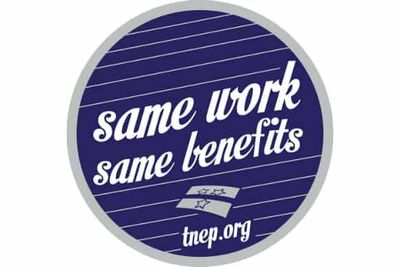Shortly after the vote to approve domestic partner benefits for Nashville Metro Employees, the lobby outside the Metro Council chamber was a political circus in the best sense of the term. Supporters and beneficiaries celebrated with their allies and friends, posing for photos and giving interviews. Once the crowds departed and the noise died down, Chris Sanders, Executive Director of the Tennessee Equality Project, sat down with us to look back at the process that his group did so much to shepherd.
JAMES GRADY: How long have domestic partner benefits been on TEP’s radar?
SANDERS: It was on our first PAC – political action committee – survey in 2007. That was really the first vote count we had on it. A lot of those members are still on the Council: They got re-elected in 2011. We surveyed on it again, and then we did a lot of work in gathering Metro employees last year. We really started working with them in about June or July last year, allowing us to have these meetings where they’ve talked with the media about the impact of partner benefits on their lives. That’s a huge difference from 2009, when we passed the non-discrimination ordinance. Without those protections, Metro employees couldn’t exactly come out and talk about it. Since non-discrimination passed, it opened up a space for them to talk. It was great to have their voices out here and to have them heard.
JG: So what signaled the shift that this was really going to happen, finally?
SANDERS: You know, it was really the mayor’s support. He’s always supported it, but it was a matter of timing. What’s interesting is how little opposition on the issue there has been. Usually equality bills get pulled on the first reading, when most bills sail through.
JG: So what changed, if the mayor has always been supportive?
SANDERS: The mayor’s support was key in getting the bill to track with the budget, which demonstrated that it was one of his immediate priorities. That gave us an indication that things were really going to go well this time.
JG: Tonight there were two main objections…
SANDERS: Yes, one moral and one economic. It is typical. They always try to raise the cost issue. People tried to raise a cost issue to the non-discrimination ordinance, and that didn’t cost anything! And obviously moral objections were raised… But you know the funny thing is that moral objections come up with regard to our community in ways that moral issues don’t generally come up when we’re normally talking about our coworkers.
JG: Could you explain that?
SANDERS: Well there’s no good explanation for the behavior, but if you’re going through a divorce or having an affair or have an open marriage, those sorts of things usually don’t become factors in considering your rights as an employee. If you’re straight and working in this kind of environment, your marriage being open isn’t an issue in terms of getting your spouse insured. But homosexuality for whatever reason gets singled out.
JG: At least in tonight’s meeting, it seemed relatively clear that we turned to moral concerns only when the economic issue failed to get traction. Do you think this signals a shift in the political safeness of bringing up moral issues?
SANDERS: I think so – but it’s never really safe to bring up morality when defending inequality, is it? But what we also have seen in these debates is a strong moral argument for these protections on the other side – our side. Councilman Scott Davis articulated in the last meeting a strong faith position and a pragmatic position for these benefits. I think we heard Councilman Westerholm lay out a progressive history of inclusion in America and where we fit in that. And those are both two very different kinds of moral argument.
JG: One of the strangest moments for me from tonight’s meeting was when Councilman Phil Claiborne expressed such surprise that his colleague from “that corner” of the room would speak in behalf of the moral imperative to pass the bill. Is there any reason for that surprise or…
SANDERS: I cannot account for Councilman Claiborne’s assessment of Councilman Matthews. Councilman Matthews is one of the sponsors of the bill! That struck me as odd. I definitely got the impression that Councilman Matthews was a bit surprised that Councilman Claiborne was surprised!
JG: How does it feel to bring this to a successful resolution?
SANDERS: It feels great! What we’ll be doing now is taking some time to assess what we need to be doing at the next level and with cities and counties around the state, what other forms of protections and advances are needed, and we want to be very thoughtful about that. It took us a long time to put together the strategies for this and for non-discrimination.
JG: Do you think that Nashville having done this will be a sign to other, smaller cities?
SANDERS: I do hope so. Nashville is a different city in the political landscape, but as the capitol I think it can be very symbolic.
